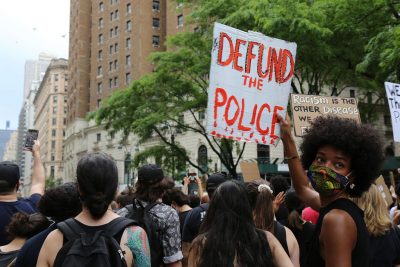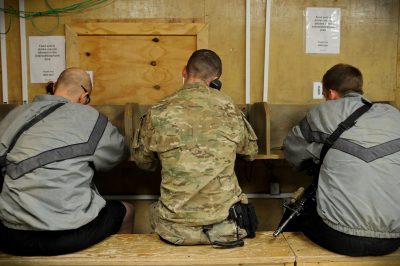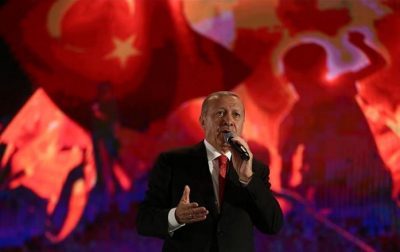
All Global Research articles can be read in 51 languages by activating the “Translate Website” drop-down menu on the top banner of our home page (Desktop version).
***
On April 27, the International Commission of Inquiry on Systemic Racist Police Violence Against People of African Descent in the United States issued its long-awaited report on the U.S.’s police-perpetrated racist violence. The Commissioners concluded that the systematic police killings of Black people in the U.S. constitutes a prima facie case of crimes against humanity and they asked the prosecutor of the International Criminal Court (ICC) to initiate an investigation of responsible police officials.
These crimes against humanity under the ICC’s Rome Statute include murder, severe deprivation of physical liberty, torture, persecution of people of African descent, and inhumane acts causing great suffering or serious injury to body or mental or physical health. All of the crimes occurred in the context of a widespread or systematic attack directed against the civilian population of Black people in the United States, as documented by the findings of fact in the 188-page report.
The 12 commissioners are eminent experts and jurists from Asia, Africa, Latin America, Europe and the Caribbean. I am one of four rapporteurs who helped draft the report. After 18 days of hearings and extensive research, the commissioners found that both U.S. law and police practices do not comply with international law.
Testimony of family members, attorneys, activists, and experts about police killings of 43 Black people, and the paralyzing of another, was presented to the commissioners. All of the victims were unarmed or were not threatening the officers or others.
Philonise Floyd, brother of George Floyd, testified before the commissioners. At the press conference announcing the release of the report, he said, “I want to thank the commissioners for recognizing my humanity as a good Black man in America, and for recognizing my brother George’s humanity, and the humanity of other families across this nation. And bringing to light and acknowledging the United States government is perpetrating crimes against humanity against Black people in the United States.”
“This finding of crimes against humanity was not given lightly, we included it with a very clear mind,” Commissioner Hina Jilani from Pakistan told the Guardian. “We examined all the facts and concluded that there are situations in the U.S. that beg the urgent scrutiny of the ICC.”
The commissioners made the following findings of fact:
1. Pretextual traffic stops are a common precursor to police killings and uses of excessive force against people of African descent. Tavis Crane was killed by police after his young daughter threw a piece of candy out the window.
2. Race-based street stops, known as “stop-and-frisk,” often trigger the use of deadly force by police. Eric Garner was suspected of selling individual untaxed cigarettes. George Floyd was suspected of using a counterfeit $20 bill.
3. Fourth Amendment violations invariably lead to the use of excessive force and police killings of Black people. Breonna Taylor was killed following the execution of a “no-knock” warrant after a judge had replaced it with a knock warrant.
4. Police routinely use excessive and lethal restraints against Black people. They include Tasers, chokeholds, compression asphyxia, “rough rides” and the use of vehicles as deadly weapons. George Floyd died from asphyxia. Freddie Gray was taken on a 45-minute “rough ride” resulting in his death.
5. Lethal police violence against Black people is exacerbated by officers’ failure to provide medical attention. For example, Andrew Kearse was kept in the back of a squad car for 17 minutes as he begged for help, repeating, “I can’t breathe.” He died of a heart attack in the car.
6. Lethal police violence against Black people experiencing a mental health crisis is systematic. After Daniel Prude’s family called the police to provide mental health assistance, he was walking naked in the street. The officers put a spit hood over his head after he began spitting. They held him face down on the pavement for two minutes and 15 seconds, and he stopped breathing.
7. Cis- and transgender Black women, girls, and femmes are disproportionately killed by police in the U.S. A friend of Kayla Moore, a mentally ill transgender woman, called for mental health assistance for Moore. Officers found a warrant for someone with Moore’s birth name, but 20 years older. They arrested her, threw her face down onto a futon to handcuff her, and she died of asphyxiation. Then they made disparaging comments about the gender identity of the woman they had killed.
8. Systemic racist police violence kills and traumatizes Black children and youth. Twelve-year-old Tamir Rice was shot to death by police as he played in a park with a toy gun. The young children of Jacob Blake witnessed their father being shot and paralyzed by police.
9. Racist police violence traumatizes and devastates families and communities. Manuel Elijah Ellis was hit, punched, choked, and tasered to death by police. “We’re broken, generations of us are emotionally tired. Our bodies are weathered, and it causes us physical illness. It causes us lifelong ailments and diseases. It causes us generational trauma that we are passing on,” Jamika Scott, a friend of the Ellis family, testified. “We are traumatized. We live in a constant state of PTSD, we are hyper-vigilant, we are fearful, we are anxious, we are depressed,” she added. “It tears holes in families and communities. And it’s not just one family, it’s what happens to one family in this community, it happens to all of us. And it happens, it has lasting echoes throughout generations.”
10. Black immigrants are particularly vulnerable to systemic racist police violence and police killings. Botham Jean, born in St. Lucia, was eating ice cream in his apartment when an officer walked in, mistakenly thinking it was hers, and shot him dead. “What was she defending,” Allison Jean, Botham Jean’s mother, asked, “as the only weapon he held was the color of his skin?”
11. Legal actors are complicit in police violence and killings of Black people through qualified immunity and systemic impunity of officers. Police officers in the United States enjoy impunity for their racist violence. They are rarely held accountable for killing black people, and qualified immunity protects them against liability for violation of constitutional rights.
- a) Alarming pattern of destruction and manipulation of evidence, cover-ups and obstruction of justice. Prosecutors have a conflict of interest and medical examiners often do the bidding of police. After Darren Wilson killed Michael Brown as Brown raised his hands and said, “Don’t shoot,” the officer bagged his own gun and washed Brown’s blood off his hands. After police killed Henry Glover, the officers burned the car with his body in it.
- b) Prosecutorial misconduct and grand jury abuse. The offending officers testified at the grand juries in the killings of both Michael Brown and Tamir Rice, and in neither case was the officer cross-examined. There were no indictments of officers in either case.
- c) Systemic impunity and lack of oversight by police. Internal affairs investigations invariably exonerate officers. Police can’t be trusted to police themselves. The “blue wall of silence” keeps officers from reporting misconduct by fellow officers. Police unions facilitate the impunity of officers. The police union got the body camera footage a few days after the killing of Daniel Prude but it took the Prude family six months to get it, and only after they filed several lawsuits.
- d) Qualified immunity. A recent U.S. District Court judge wrote, “[J]udges have invented a legal doctrine to protect law enforcement officers from having to face any consequences for wrongdoing. The doctrine is called ‘qualified immunity.’ In real life, it operates like absolute immunity.” In case after case heard by the commissioners, victims’ families faced extraordinary obstacles to holding officers accountable for the killing of their family members.
Violations of Human Rights
The commissioners found that systemic racist police violence against people of African descent in the United States has resulted in a pattern of gross and reliably attested violations of human rights and fundamental freedoms. These include violations of the right to life; the right to liberty and security; the right to mental health; the right to be free from arbitrary detention; and the right to be free from torture and other cruel, inhuman, or degrading treatment, including by the use of tasers, chokeholds, and compression asphyxia. The U.S. Torture Statute only punishes torture committed abroad.
The commissioners also found violations of the right to be free from discrimination based on race, gender, disability, or status as a child. The “stop and frisk” doctrine is an invitation for racial profiling, and the Supreme Court allows pretextual stops for traffic violations even when the officer is motivated by racism, in violation of international law.
In addition, the commissioners found violations of the right to a fair trial and the presumption of innocence, which constitute extrajudicial killings, as well as the right to be treated with humanity and respect. The commissioners found violations of the duty to provide medical care to detained persons; to ensure investigations of extrajudicial killings that are independent, competent, thorough, and effective; and to prosecute suspects and punish perpetrators to ensure they are held accountable.
The commissioners found that both U.S. laws and police practices — as documented in the 44 cases heard by the commissioners and national data — do not comply with the international standards on the use of force.
According to international standards, law enforcement may only use force when strictly necessary, and it must be proportionate to the seriousness of the harm it is meant to prevent. They may not use firearms except in self-defense or defense of others, and only against the imminent threat of death or serious bodily harm. Lethal force cannot be used to protect law and order or to safeguard property, according to international law.
But Supreme Court jurisprudence allows police officers to use deadly force if they have probable cause to believe the suspect committed a past crime. No state laws require that lethal force can only be used as a last resort when necessary to prevent imminent death or serious injury.
Not Just “a Few Bad Apples”
The commissioners found that contrary to the popular notion that unjustified killings of Black people by police are merely the actions of “a few bad apples,” the real problem is structural racism that is embedded in the U.S. legal and policing systems.
Collette Flanagan, founder of Mothers Against Police Brutality, whose son Clinton Allen was murdered by police, testified before the commissioners. At the press conference launching the report, Flanagan called out police departments who “are still insisting that policemen, when caught on camera using unnecessary deadly force, are merely just a few bad apples.” On the contrary, she said, “We are into orchards of bad apples with trees that have diseased roots tainted with racism and white supremacy, and they are bearing rotten fruit.”
Indeed, from March 29 (the day the trial of Derek Chauvin for killing George Floyd began) through April 18, at least 64 people in the United States died at the hands of law enforcement. More than half of the victims were Black or Brown.
Recommendations
The commissioners addressed their recommendations to several entities, including the United Nations Human Rights Council and the High Commissioner for Human Rights, as well as the executive branch of the U.S. government and the U.S. Congress. The commissioners recommended several reforms, as well as the passage of the BREATHE Act, which is aimed at divesting federal resources from policing and investing instead in new approaches to community safety.
The commissioners call on the Office of the Prosecutor of the ICC, upon receipt of this report of the Commission of Inquiry, to initiate an investigation into crimes against humanity committed and condoned by officials in the United States. The U.S. has not ratified the Rome Statute for the ICC. The commissioners called on the executive branch of the U.S. to sign and ratify the Rome Statute. In the meantime, the commissioners recommend that the United States submit to the jurisdiction of the ICC for purposes of an investigation into these crimes against humanity against people of African descent in the U.S.
*
Note to readers: please click the share buttons above or below. Forward this article to your email lists. Crosspost on your blog site, internet forums. etc.
Copyright © Truthout. Reprinted with permission.
Marjorie Cohn is professor emerita at Thomas Jefferson School of Law, former president of the National Lawyers Guild, deputy secretary-general of the International Association of Democratic Lawyers, and a member of the advisory board of Veterans for Peace. Her most recent book is Drones and Targeted Killing: Legal, Moral, and Geopolitical Issues.
She is a frequent contributor to Global Research.















